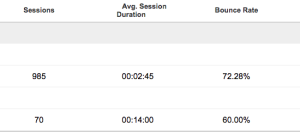In a recent survey of white collar workers that had trialed working from home for at least four months during the pandemic, the youngest workers – those aged 18 to 24 years old – were the least likely to want to work remotely in the long run.
Just 15% said they want to work from home five days a week once the threat of the pandemic subsides, the survey by Claromentis found. That’s significantly lower than the average worker – 20% of whom want to work remotely 100% of the time – rising to 26% among 45 to 54-year-olds.
Remote workers in this youngest age group are also more likely than the average employee to feel disconnected from their team, to miss face-to-face communication, and to sense a lack of trust from their managers.

- Young employees have more to gain from increased time in the office, as those aged 18-24 are more likely to feel disconnected from their teams, to miss face-to-face communication, and to sense a lack of trust from their managers when working remotely, the 2021 survey Claromentis found Rodrigo_SalomonHC / Pixabay
Earlier this year, Goldman Sachs CEO David Solomon rejected remote working as a “new normal” and said he didn’t want another cohort of 3,000 young new recruits missing out on the “direct mentorship” they need.
The youngest employees in any workplace have, arguably, the most to gain from working in an office – to shadow more experienced workers, soak up culture, impress their peers and make their mark, network and make friends.
The importance of the social side of the office is often glossed over. But Gallup research has repeatedly shown a strong link between workplace friendships and the amount of effort people make in their jobs. Women who strongly agreed with the statement ‘I have a best friend at work’ are more than twice as likely to be engaged employees (63%) than women who say otherwise (29%).
Apple CEO Tim Cook put it well this week when he sent a memo to staff that read: “For all that we’ve been able to achieve while many of us have been separated, the truth is that there has been something essential missing from this past year: each other.”
Cook also outlined his long-term plan, which is that Apple employees should return to the office for at least three days a week, with Wednesdays and Fridays designated optional work from home days.
Perhaps the best way to support young workers is to offer a hybrid working arrangement, so they can get the best of both setups. But there are plenty of ways to improve their work from home experience in the digital workplace, too:
- To make someone new to the workplace feel welcome, excited, engaged, included and informed, create a virtual onboarding ‘experience’. Create a personalised profile that’s ready for their arrival, packed with everything a new recruit needs, including team profiles, training videos, HR portal access, company and announcement news, policies, and upcoming events. Ask their colleagues to leave welcome messages that they’ll see as soon as they login. Think about what information would be most useful to a newbie: from who deals with holiday requests to how to order stationery.
- Use quality collaboration tools that support teamwork and good communication. If multiple people can work on the same project remotely, and ‘talk’ to each other from within that project, it makes it easier for younger employees to watch, learn and ask questions, as well as to impress their peers, without having to be in the same room.
- As well as a designated mentor, match up younger workers with a different buddy each week for a video call, ideally from teams and departments they don’t work closely with. This will offer valuable networking opportunities and a useful insight into different areas of the business.
- Encourage engagement with internal social media feeds on your company intranet. Younger workers may need a little nudge to feel confident enough to comment on company news and add their opinions to requests for ideas, but this is an important part of engaging them.
- Add ‘thank you’ tools to your digital workplace so younger workers can publicly show their appreciation for colleagues who’ve offered them help, support and guidance, and so that more senior employees can do the same for them – a huge confidence boost to anyone new to the workplace.
Business & Finance Articles on Business 2 Community
(49)
Report Post







